
"Deep Inside My Heart" is a duet by former Eagles member Randy Meisner with Kim Carnes. It became a hit in the United States during the summer of 1980, reaching #22 on the Billboard Hot 100. The song was a bigger hit in Canada, where it reached #12.

"That Girl" is a song by American R&B singer and songwriter Stevie Wonder. The song was the leading single from Wonder's album-era 1982 greatest-hits compilation, Stevie Wonder's Original Musiquarium I, as one of four newer songs from the collection. The song spent nine weeks at number one on the Billboard R&B singles chart – the longest time a Stevie Wonder single spent at the top spot – and reached number four on the Billboard Hot 100.

"Tell Me a Lie" is a song, composed by Mickey Buckins, Barbara Wyrick. Originally recorded by Lynn Anderson for her 1974 What a Man My Man Is album, it was released later that same year as a single by Sami Jo Cole, who took it to number 21 on both of the major U.S. pop charts. It also charted in Canada (#17). Cole's version was also an Adult Contemporary hit, reaching number 14 in the U.S. and number 27 in Canada.

"Montego Bay" is a song co-written and performed by Bobby Bloom about the city in Jamaica of the same name. The song was a Top 10 hit for Bloom in the Fall of 1970 on both sides of the Atlantic. It reached #3 on the UK Singles Chart, #5 on the Canadian RPM 100 Singles Chart, #7 on the Australian Go-Set Singles Chart and #8 on the US Billboard Hot 100. The song was co-written and produced by Jeff Barry. In the master tape of the song, Bloom breaks into a chorus of "Oh, What a Beautiful Mornin'" at the end of the recording. The song features a whistler, as well as Jamaican instruments to illustrate the section called "Montego Bay," in a calypso genre.
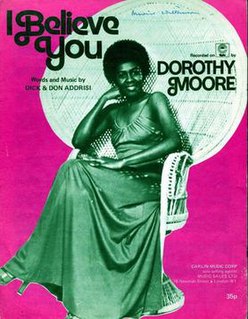
"I Believe You" is a love ballad composed by Don and Dick Addrisi which was a 1977 single for Dorothy Moore; taken from her self-titled Dorothy Moore album. "I Believe You" reached #5 R&B and crossed over to the US Pop Top 30 at number 27. The track also reached number 20 in the UK.
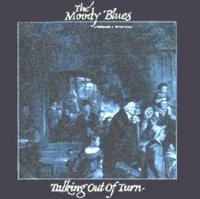
"Talking Out of Turn" is a 1981 single by the English progressive rock band the Moody Blues. It was the third and final single released from their 1981 album Long Distance Voyager.

"Desirée" is a 1977 song written and recorded by Neil Diamond and included as a track on Diamond's 1977 album, I'm Glad You're Here with Me Tonight. The single peaked at number 16 on the Billboard Hot 100 and reached number one on the U.S. Easy Listening chart to become his fifth number one on that chart. The song likewise reached number one on the Canadian AC chart.

"Theme from The Greatest American Hero" is a song composed by Mike Post with lyrics by Stephen Geyer, and sung by American singer Joey Scarbury. It serves as the theme song for the 1980s television series The Greatest American Hero. The track was later included on Scarbury's 1981 debut album America's Greatest Hero.

"Swearin' to God" is a song written by Bob Crewe and Denny Randell. It was recorded by Frankie Valli and released in May 1975 as a single from his album Closeup. It is a love song whose lyrical hook is a more literal use of the expression "I swear to God" :

"Gypsy Woman" is a 1961 rhythm and blues song written by Curtis Mayfield and recorded by his group the Impressions. The group's first single following the departure of lead singer Jerry Butler, it reached No. 2 on the R&B chart, No. 20 on the Billboard Hot 100 and number 17 on the Cash Box chart. It also appeared on the group's 1963 eponymous debut album.

"Stormy" is a hit song by the Classics IV released on their LP Mamas and Papas/Soul Train in 1968. It entered Billboard Magazine October 26, 1968, peaking at #5 on the U.S. Billboard Hot 100 chart and #26 Easy Listening. The final line of the chorus has the singer pleading to the girl: "Bring back that sunny day". This single release along with the prior release of "Spooky", and soon afterward the release of "Traces", made great success for the band, a part of the well-known songs from the ensemble.
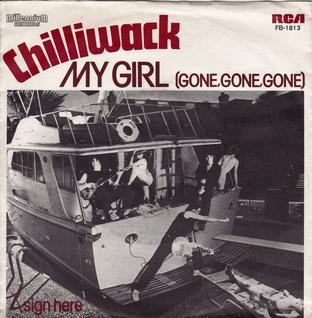
"My Girl " is a song that was performed by the Canadian group Chilliwack. Co-written by bandmembers Brian MacLeod and Bill Henderson, it was released on the band's 1981 album Wanna Be a Star.

"Promises" is the title of a 1981 song by Barbra Streisand. The song was written by Barry Gibb and Robin Gibb, who also provide backing vocals. It was the fourth of four singles released from her album Guilty.

"Thunder and Lightning" is a 1972 song by American singer and pianist Chi Coltrane. It was the first release from her eponymous debut album, peaking at No. 17 on the US Billboard Hot 100, No. 15 on Cash Box and No. 12 on Record World. It also charted at No. 18 on the Canadian RPM magazine singles chart.

"Keep Your Eye on the Sparrow", also known as "Baretta's Theme", is a song written by Morgan Ames and Dave Grusin, recorded by multiple artists during the summer of 1975. Merry Clayton's version was the first to chart, reaching #45 on the U.S. Billboard Hot 100. Then a version by Rhythm Heritage became a Top 20 hit in 1976.
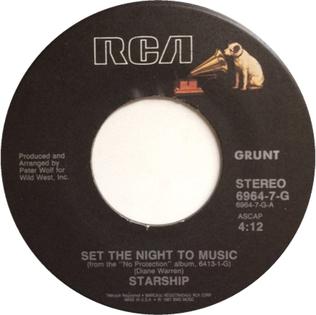
"Set the Night to Music" is a song written by Diane Warren and recorded by Starship on their LP, No Protection (1987). It became a major hit for Roberta Flack in 1991. Starship's original version became a Top 10 hit on the U.S. Billboard Adult Contemporary chart, reaching number nine in the spring of 1988, and also charted minorly in Canada. The song appeared at the end credits of the 1988 fantasy-comedy film Vice Versa starring Judge Reinhold and Fred Savage
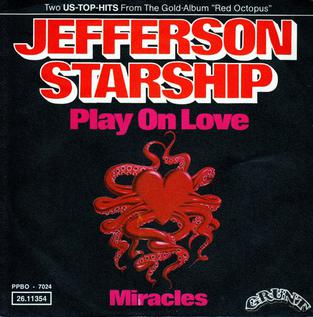
"Play on Love" is a 1975 song by Jefferson Starship. It was the second of two singles issued from their Red Octopus LP.

"Only You Know and I Know" is a song written and originally recorded by Dave Mason in 1970. It is a track from his LP, Alone Together. The song was his first charting single, and it became a modest hit for him in the U.S. and Canada.

"I Got to Know" is a song recorded by the American band Starbuck. It was the second of three singles from their debut LP, Moonlight Feels Right. Written and produced by Bruce Blackman, the song was released in September 1976. Like its predecessor, "Moonlight Feels Right," the song features a prominent marimba solo by co-founding band member Bo Wagner.

"The Drum" is a song recorded by Bobby Sherman from his Portrait Of Bobby LP. It was released as a single in the spring of 1971, the second of two from the album. The song was written by Alan O'Day, his first of five Top 40 chart credits.




















